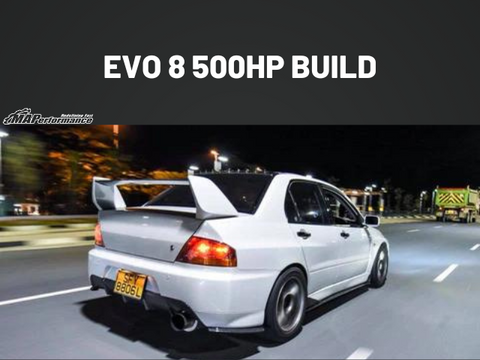Here are a few tips to avoid piston failure, & make sure you don't turn your Subaru pistons into a set of paperweights
Our years of experience in the Subaru aftermarket have shown us a few things. The first is how to make a ton of power via bolt-ons, an engine build, and a performance tune. We've also learned a few things about what not to do - like how to not blow up engines. Unfortunately, the latter seems to occur very often with the EJ25 series of Subaru engines, and even in stock form they have shown to be prone to catastrphic engine failure. There are a few different theories regarding the failure of the pistons, each one as true as the last.

We've assembled this short list of reasons why Subaru STi / WRX pistons and engines fail, as well as a few solutions that every Suburu owner can employ via tuning, installation of a few parts at home in their garage, and remember to do on a daily basis. First off, lets define a few items inside your engine. The piston inside your EJ25 series engine are cast from Aluminum alloys. As you may know, aluminum can be weak if exposed to heat, so pistons that could survive engine combustion temperatures had to be developed. New alloys such as Y alloy and Hiduminium were designed with implicit intentions for use as automotive pistons.

The "ringland" portion of the piston holds the piston rings via channels cut into the piston head. On the Subaru EJ255 and EJ257, there are three ringlands, which each have a separate job in regards to protecting the engine and piston. In some cases, these ringlands have been identified as the weak point on most Subaru engines. The first ringland is an area that typically fails the most. It's most susceptible to damage since it supports the first compression ring, which seals out heat and combustion gases. The second ringland plays defense, blocking any remaining combustion gases from the combustion chamber and blocking oil that has snuck past the third ring. The third ring is special, as it is designed to force oil into the various parts of the piston, which helps lubricate and cool the combustion chamber and piston. Below are a few of the reasons why many believe Subaru Piston ringlands fail.

At the end of the day, the biggest reason is excess heat and pressure generated by engine knock, detonation, or pre-ignition.
Reason #1- The Factory Tune is Junk
While not entirely true, this still holds value as an acceptable reason given the sheer value of the tune. While Subaru did a great job tuning for all altitudes and climates at various boost levels, there has been some notice of grey areas within the engines tune, especially when driven under high load. Stock engines as well as modded engines are at risk here. What do we recommend? Get your car tuned after every mod to ensure you're safe from detonation. If you're stock, consider getting a wideband AFR gauge like the AEM UEGO or other popular brands to make sure your air-fuel-ratio's are on point through the entire power band. For tuning check out the COBB Accessport V3!
Reason #2 - Blow By
Many performance companies attribute premature Subaru engine failure to a poorly designed crankcase breather setup. This sends large amounts of oil back through the intake, dilating fuel octane and causing knock. Turbo engines cause lots of engine blow-by, and it gets considerably worse when running higher boost, but other instances add to the amount of blow-by your engine see's. What do we recommend? Run a proper Air-Oil-Separator (AOS) system that pulls oil from the intake system via a catch can, and recycles clean air back into the intake system. See our post here for best Air-Oil-Separators.
Reason #3 - Over Driven Engines
In our opinion, one of the worst things you can do to your EJ25x is put heavy load on it at a lower RPM. Building 14 – 18 PSI of boost at 3000 RPM is a high load : low RPM situation, that may not have been properly tuned for your vehicle, especially if you have an aftermarket tune. Some tuners don’t bother sticking the car in 5th or 6th gear and test for knock. You also shouldn't drive the car hard unless you absolutely need to. Despite popular consensus, the Subaru EJ25x wasn't designed for repeated beatings, so treat the engine nicely and it will last as long as you need it to! What do we recommend? Treat the engine well with regular maintenance, keep the oil changes and coolant topped off, downshift and get above 3500RPM before you lay the hammer, and don't drive like you're outrunning your ex.
Reason #4 - Weak Pistons in Heavily Modded Environments
This should come as no surprise to most people. First off, these cars are mass produced, and Subaru needs to consider their bottom line with every aspect in the development of the car, and forged pistons aren't exactly cheap to produce. The factory pistons are as strong as they need to be for stock and slightly modded WRX / STi's, but when you start talking about upgraded stock frame turbo's and tons of boost, the reliability of the stock slugs become questionable. What do we recommend?Forged Pistons if you've got more than bolt-ons.

Reason #5 - Combustion Heat
This reason is a bit less common and harder to prove as a direct result to piston failure, but definitely worth mentioning. Subaru cylinder heads have quench pads that squeeze air and fuel into the combustion chamber. An interesting design, but the pads are prone to hotspots which create pre-ignition and localized heat rise, effectively weakening the piston leading to melting.
What do we recommend? Use the correct grade fuel and run an AOS.
Hopefully these tips have explained a few things about the Subaru engine, and opened your eyes to how easy it is to prevent premature engine failure in your Subaru WRX / STi. If you have any questions or concerns, feel free to email us, give us a call, or drop us a comment below! Keep an eye on the blog for more awesome Subaru tips, aftermarket parts, and technical installation guides!






Comments (60)
Suck it.. Mines an ej20 so I’m not as fucked
Dakota Casady
Buy an Evo…..problem solved lol
Mena Kirolous
David ;)
Needs a 4G
Don’t get a Suburu
Logan Redden
Steven White
Ecoboost 2.3! Problem solved!